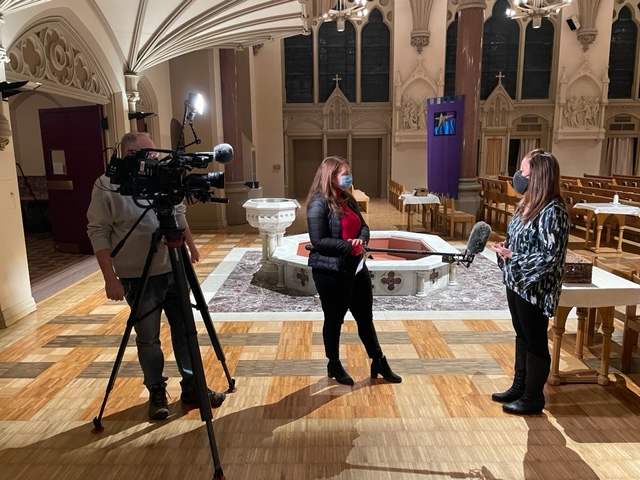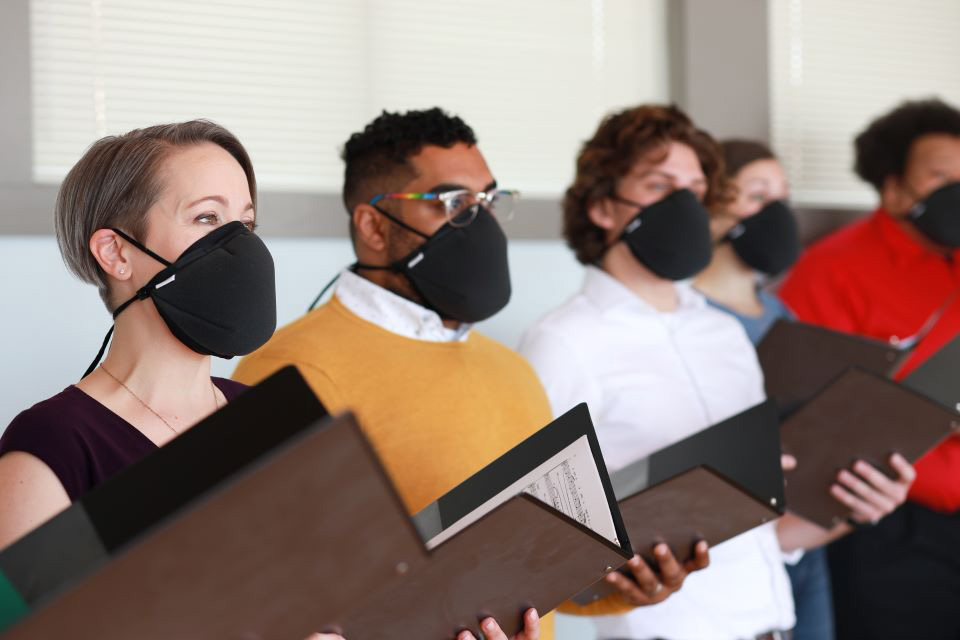Pandemic Spurs SLU Music Professor to Develop VocalEase Mask
Bridjes O'Neil
Communications Specialist
bridjes.oneil@slu.edu
314-282-5007
Reserved for members of the media.
Vocalists sported a new mask at Saint Louis University’s Mastersingers' concert Tuesday, Dec. 7, at St. Francis Xavier College Church. The mask is the brainchild of a SLU assistant professor and is taking the market by storm.
As a professional singer and voice professor, Stephanie Tennill (A&S ‘99), observed a critical problem for singers and speakers that seemed to go neglected at the start of the pandemic — the lack of a mask to help prevent the spread of COVID-19 that also provided the clarity, comfort and protection vocal performers need. To meet this need, she created VocalEase, an acoustically transparent mask for speech and singing. With the help of SLU’s Research Innovation Group, Tennill’s solution is now a reality, with masks being sold commercially.
“We are excited to offer a mask that not only allows singers and speakers to reclaim the beauty of full vocal relationship and good vocal health, but to do so with a high level of aerosol protection,” said Tennill, assistant professor of music in the Department of Visual and Performing Arts.
“COVID took our voices away, and now is the time to take them back!”
Stephanie Tennill
Vocal communities spanning from amateurs to elite professionals no longer have to choose between safety and sound, Tennill said.
Tennill worked with Andrew Hall, D.Sc., associate professor of biomedical engineering and director of SLU’s Center for Additive Manufacturing as well as professional costume designer, Noelle Wagner. She also collaborated with Anne K. Miller, director of research commercialization of SLU’s Research Innovation Group, and other colleagues to develop the mask and apply for a patent assigned to SLU.
Hall became involved after he developed an N-95 mask alternative for hospital use and said he was familiar with mask design, testing requirements, and methodologies. Hall used special equipment called PortaCount® to test the aerosol particle filtration of the masks as well as their fit and function.
“In preliminary filtration testing, the VocalEase Mask achieved between 62-67% filtration levels when testing in the aerosol particle range of 0.2 μm-1.0 μm, the most vulnerable range for filtration,” Tennill said. “This is well above the Level 2 performance standard as put forth by American Society for Testing and Materials for barrier face coverings, and above most day-to-day wear masks as well as current singing masks on the market.”
Several of Tennill’s students, like London Kimble, tested the masks and provided valuable feedback. Kimble is a sophomore at SLU majoring in Theatre and Communication while minoring in Music and Dance. She has performed in theatrical productions at SLU and acts professionally through Talent Plus. She said regular cotton masks have multiple downsides for vocalists and presenters.
“Masks cut off your oxygen supply making it difficult to breathe deeply. We start yelling so we don't sound muffled, which induces vocal fatigue and straining,” Kimble said. “We also have a limited range in motion while singing or speaking wearing a mask, which can cause tension in our jaws and the base of our tongues.”
Kimble said the VocalEase Mask allows you a full range of motion and breath support, almost as if you weren't wearing a mask at all.
These sentiments were shared by professional mezzo opera singer Emma Rose Sorenson.

In fact, interest in the product skyrocketed after Sorenson raved about the mask’s performance in a viral TikTok video. Tennill had previously provided Sorenson and other principals with masks to wear during indoor rehearsals while in town for a performance of “Les contes d’Hoffmann” at Union Avenue Opera this summer.
VocalEase Gives Back
Tennill approaches VocalEase with the mindset of a social entrepreneur.
“I didn’t start this project to build a company but to solve a problem,” said Tennill.
As CEO, she says the company prides itself on its positive social impact accomplished through its partnerships. Masks are manufactured with The Collective Thread, a local nonprofit cut and sew manufacturer that provides economic empowerment to vulnerable refugee and immigrant women by teaching them new skills and offering them living wage jobs. To support its packaging and fulfillment needs, the company works with JSI, which provides employment for developmentally disabled adults.
A portion of proceeds from each mask sold benefits the nonprofit Sing for Hope, which is based in New York, where Tennill attended grad school and worked professionally before relocating home to St. Louis after accepting her current position at SLU. The company also donates masks at no cost to vocal programs and arts initiatives in under-resourced communities.
“For every 100 masks manufactured, we continue to allocate approximately 10 to be donated,” Tennill said. “We have already donated several hundred masks and look forward to continuing to supply them at no cost to vibrant vocal communities in need.”
To learn more, visit www.vocaleasemask.com
About Saint Louis University
Founded in 1818, Saint Louis University is one of the nation’s oldest and most prestigious Catholic institutions. Rooted in Jesuit values and its pioneering history as the first university west of the Mississippi River, SLU offers nearly 13,000 students a rigorous, transformative education of the whole person. At the core of the University’s diverse community of scholars is SLU’s service-focused mission, which challenges and prepares students to make the world a better, more just place.


















